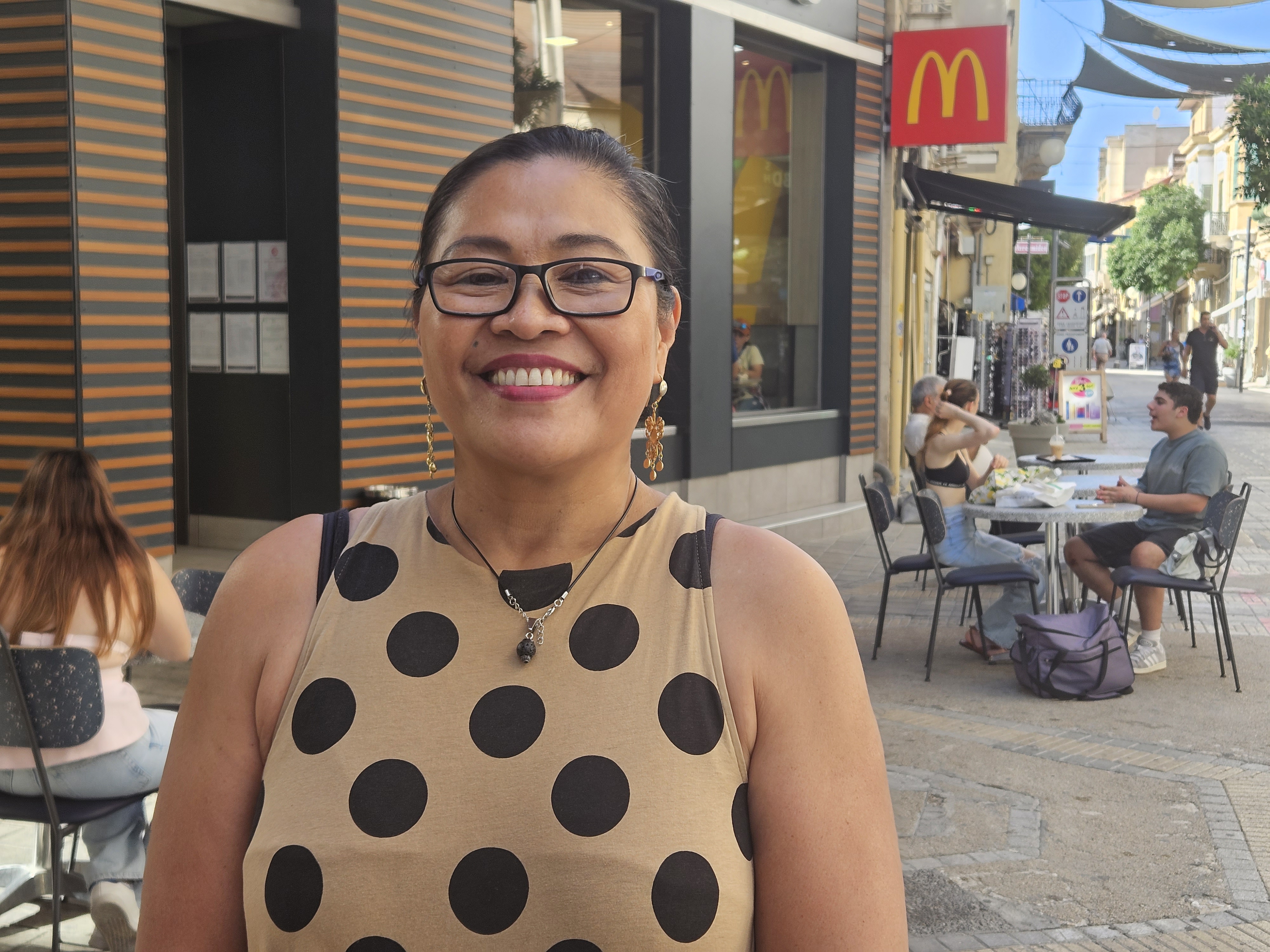For decades they’ve cleaned our homes, looked after our kids and cared for our ailing parents. And they’re still paid a pittance
Let’s imagine a young Filipino woman. Let’s call her Althea, which was apparently the most common girl’s name in the Philippines in 2023.
What will Althea experience, should she decide to try and find work in Cyprus?
For a start, she’ll be part of a thriving community. There are around 18,000 Filipinos on the island, according to Ester Beatty, chairperson of the Federation of Filipino Organisations in Cyprus, though that includes Filipinas married to EU citizens and their second-generation offspring.
Those 18,000 include skilled workers like bakers and chefs (City of Dreams in Limassol employs many Filipinos). Althea, however, is far more likely to become a domestic worker – which, till a couple of years ago, was the only option, and still accounts for the majority of jobs in the community.
This will mean paying money to an agent in the Philippines, a hefty ‘placement fee’ which may be €1,500-2,000, says Beatty. Althea might have to borrow, and will spend her first few salaries trying to pay back this money.
That’s especially because the salary she’ll be getting in Cyprus is so low.
The minimum salary for third-country nationals working as maids or carers is €460 a month gross. “The employer is allowed to deduct 25 per cent of the gross salary for food and accommodation, if they live with their employer,” says Beatty, plus “8.2 per cent for social insurance contribution, and Gesy which at the moment I think is 2.6 per cent”.
By the time everything has been deducted, it’s about €320 net – which has been the case for decades now. “Since the 1990s, the salary hasn’t changed at all.”
Two caveats here. First, that’s the minimum salary, and an employer is free to pay more if they wish. There are many stories of employers – especially in Limassol, and especially Russians or Israelis – who prefer to have their maids living out and pay them a normal, four-figure salary. Most, however, go for the minimum.
The second caveat has to do with Filipinas in particular. Even though Nepalis, Vietnamese, Sri Lankans and so on must accept the €320, the Philippines government has decreed that “a Filipino domestic worker’s net salary should be €400,” says Beatty. “Anything below €400, they will not sign the contract.”
This is good news for Althea, who gets a little extra – usually a gross salary of €595, translating to €400 net. It’s still a pittance, though, especially when most of it has to go back to support family in the Philippines.
The usual argument is that, while a domestic worker’s salary is low for Cyprus, it allows them to live like a queen in their home country.
That’s not really true, though, says Beatty. “Philippines is becoming the call centre of the world” at the moment. Many locals work for global corporations, earning good money. Besides, it’s only common sense that a salary that’s stayed the same since the 90s will be less impressive now than it was in the 90s.
Still, though, while in Cyprus, Althea won’t have to pay for rent, bills or food – and she’ll still end the month with €400 in her pocket! Surely that’s a pretty good deal for a low-income worker?
Beatty agrees that many people earning minimum wage on the island (€900 gross for new hires, up to €1,000 after six months) probably have it worse.
“But those who are earning the minimum salary, they are working seven to eight hours a day,” she points out. “OK, you have some bills to pay from your own pocket – but you can also do some extra jobs.”
Domestic workers, on the other hand, “are working like slaves. They start from six o’clock, until probably eight o’clock at night – cleaning the house, cooking, looking after the children, everything… It’s supposed to be seven hours per day, six times a week. But nobody really follows that.”
The other issue is the kind of work they’re forced to do.
Althea may have no problem cleaning her employer’s house – but it’s a much bigger responsibility to care (often for the same salary) for the employer’s elderly parent who suffers from Alzheimer’s, without even having trained as a nurse.
Forty-nine-year-old Beth is a real-life Althea. She’s been here for 14 years, she told the Cyprus Mail – and her duties now include looking after ‘yiayia’ six days a week (the old lady’s daughter takes over on Sunday).
Grandma gets “confused”, and doesn’t always remember Beth’s name. She can no longer dress herself, or clean herself, or take a bath on her own. Beth does all that, and also sleeps in the next room in case of a night-time emergency.
“Sometimes you feel it’s not normal, this arrangement,” she admits – but she doesn’t mind overall, because her employers are “very good people” and because “for a long time I worked for [grandma]… It’s like a family now, for me. So I don’t have any regrets, because I feel like she’s my second mother now.”
That’s a good attitude, but it shouldn’t obscure the enormity of what’s changed.
Having a maid to help clean the house is just menial work. Looking after a sick parent with dementia, though, is among the most painful and traumatic things in a person’s life.
Employers in Cyprus are basically outsourcing that pain and trauma to a stranger, feeling virtuous without doing anything themselves – and paying peanuts for it.
Let’s say Althea is stressed out by this difficult work, and wants a change. Or perhaps she’s just bored of being a domestic worker. After all, says Beatty, “a lot of Filipinas who come and work here, most of them have a college degree”.
Other EU countries offer more in this regard. Many Filipinas are moving to Malta, for instance – “because in Malta they are able to work in any industry, as long as they are capable of doing it”. Countries like Poland or Slovakia allow them to work in a factory, with fixed hours and a much better salary.

In Cyprus, though, the rules are rigid: once a domestic worker, always a domestic worker. Even if Althea managed to obtain a ‘release’ from her employer, the only way to change job is by getting married to a Cypriot or EU citizen, after which she could pay her own social insurance and hopefully freelance.
And what if Althea keeps going regardless? What if, after many years of work in Cyprus, she decides to apply for permanent residence, or even citizenship by naturalisation? Alas, her chances of success are slim.
“I can count on my fingers [of one hand] how many Filipinas managed to get citizenship without being married,” says Beatty. Even in those few cases, “it’s because their employer had connections, and supported them… I can count with my five fingers!”
Again, other EU countries make it easier. Here, however, the process takes years, criteria are strict (though having to learn Greek is “fair enough”), and the outcome, in almost all cases, is that applications are simply rejected with no reasons given.
At this point, Althea may have been here for 20 years or more. No longer young, she decides to go back home, a place she recalls only vaguely. Beth, for instance, has only been back to the Philippines three times in 14 years, the last time for her older son’s graduation.
The only consolation is that now – after years of paying social insurance, or having it deducted from her salary – she’s entitled to a lump-sum pension from the Cyprus government.
Even this, however, isn’t always easy according to Beatty, who tells in excruciating detail of her recent efforts on behalf of a repatriated Filipina – a case of being made to “run around in circles”, and getting pinballed from one civil servant to another.
“The Cypriot government will not just give it open-handedly to anybody,” she explains. “You have to fight. You have to argue.”
It’s enough to make Althea wonder if it’s worth finding work in Cyprus at all.







Click here to change your cookie preferences